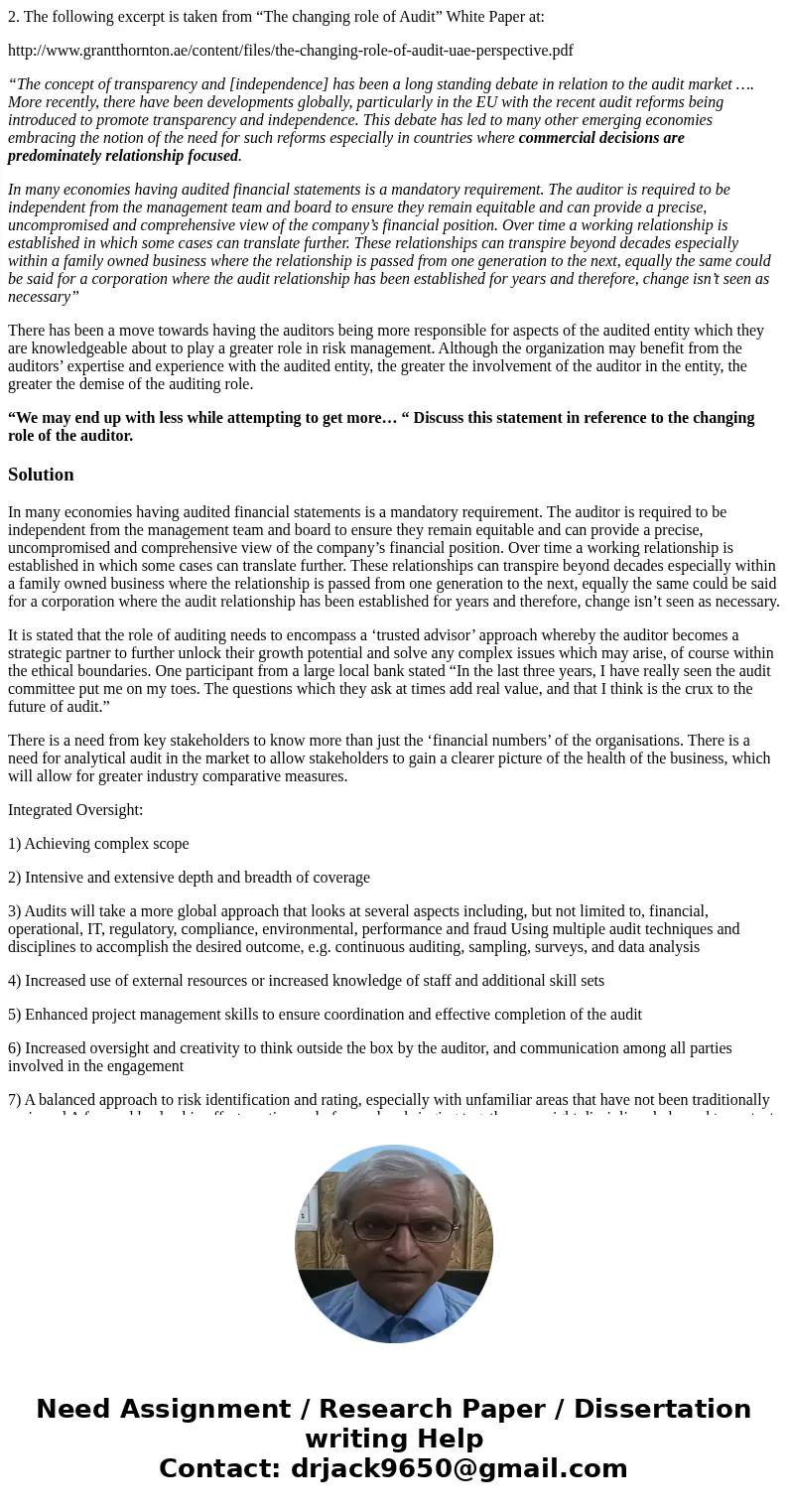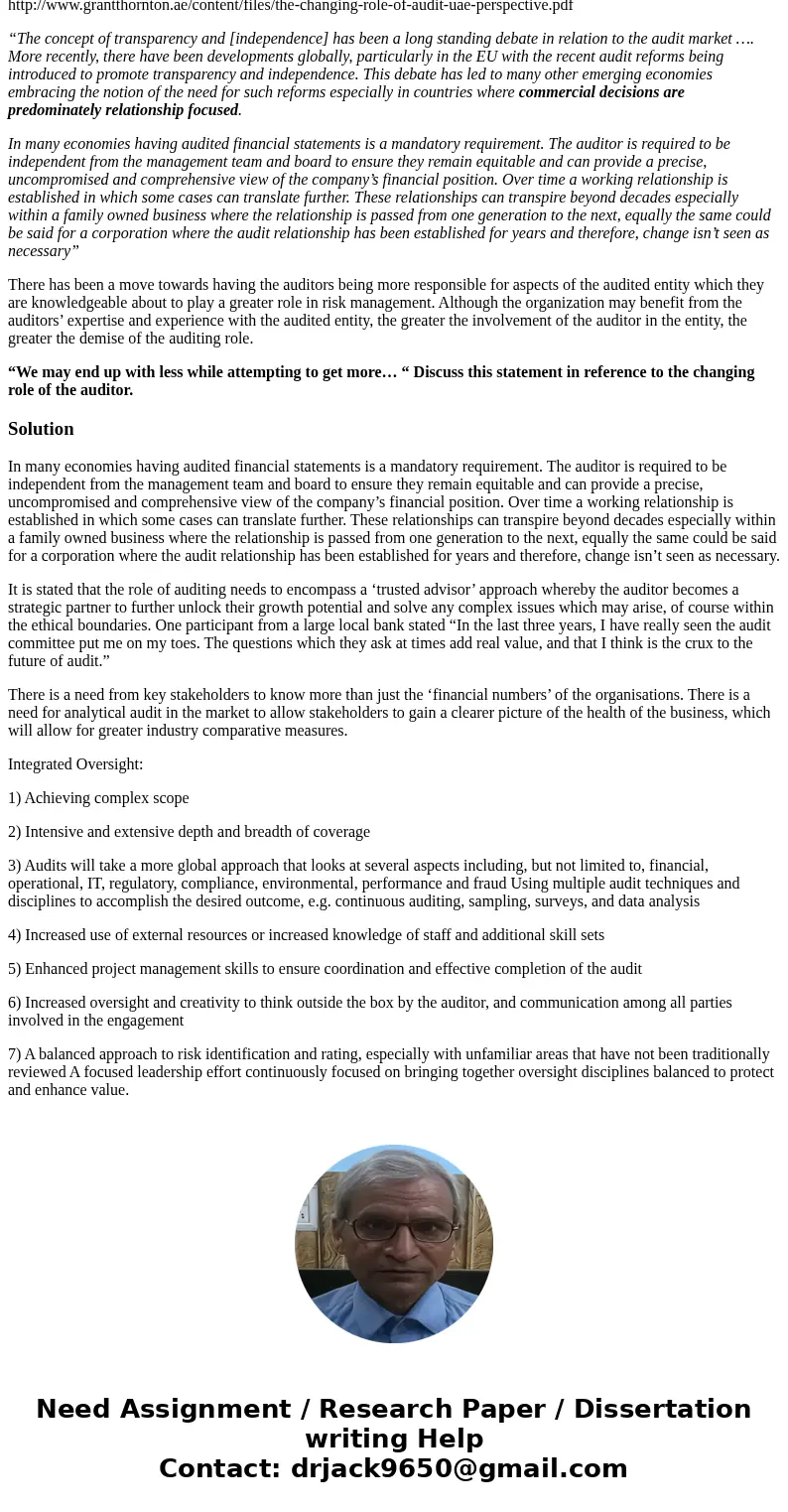2 The following excerpt is taken from The changing role of A
2. The following excerpt is taken from “The changing role of Audit” White Paper at:
http://www.grantthornton.ae/content/files/the-changing-role-of-audit-uae-perspective.pdf
“The concept of transparency and [independence] has been a long standing debate in relation to the audit market …. More recently, there have been developments globally, particularly in the EU with the recent audit reforms being introduced to promote transparency and independence. This debate has led to many other emerging economies embracing the notion of the need for such reforms especially in countries where commercial decisions are predominately relationship focused.
In many economies having audited financial statements is a mandatory requirement. The auditor is required to be independent from the management team and board to ensure they remain equitable and can provide a precise, uncompromised and comprehensive view of the company’s financial position. Over time a working relationship is established in which some cases can translate further. These relationships can transpire beyond decades especially within a family owned business where the relationship is passed from one generation to the next, equally the same could be said for a corporation where the audit relationship has been established for years and therefore, change isn’t seen as necessary”
There has been a move towards having the auditors being more responsible for aspects of the audited entity which they are knowledgeable about to play a greater role in risk management. Although the organization may benefit from the auditors’ expertise and experience with the audited entity, the greater the involvement of the auditor in the entity, the greater the demise of the auditing role.
“We may end up with less while attempting to get more… “ Discuss this statement in reference to the changing role of the auditor.
Solution
In many economies having audited financial statements is a mandatory requirement. The auditor is required to be independent from the management team and board to ensure they remain equitable and can provide a precise, uncompromised and comprehensive view of the company’s financial position. Over time a working relationship is established in which some cases can translate further. These relationships can transpire beyond decades especially within a family owned business where the relationship is passed from one generation to the next, equally the same could be said for a corporation where the audit relationship has been established for years and therefore, change isn’t seen as necessary.
It is stated that the role of auditing needs to encompass a ‘trusted advisor’ approach whereby the auditor becomes a strategic partner to further unlock their growth potential and solve any complex issues which may arise, of course within the ethical boundaries. One participant from a large local bank stated “In the last three years, I have really seen the audit committee put me on my toes. The questions which they ask at times add real value, and that I think is the crux to the future of audit.”
There is a need from key stakeholders to know more than just the ‘financial numbers’ of the organisations. There is a need for analytical audit in the market to allow stakeholders to gain a clearer picture of the health of the business, which will allow for greater industry comparative measures.
Integrated Oversight:
1) Achieving complex scope
2) Intensive and extensive depth and breadth of coverage
3) Audits will take a more global approach that looks at several aspects including, but not limited to, financial, operational, IT, regulatory, compliance, environmental, performance and fraud Using multiple audit techniques and disciplines to accomplish the desired outcome, e.g. continuous auditing, sampling, surveys, and data analysis
4) Increased use of external resources or increased knowledge of staff and additional skill sets
5) Enhanced project management skills to ensure coordination and effective completion of the audit
6) Increased oversight and creativity to think outside the box by the auditor, and communication among all parties involved in the engagement
7) A balanced approach to risk identification and rating, especially with unfamiliar areas that have not been traditionally reviewed A focused leadership effort continuously focused on bringing together oversight disciplines balanced to protect and enhance value.


 Homework Sourse
Homework Sourse